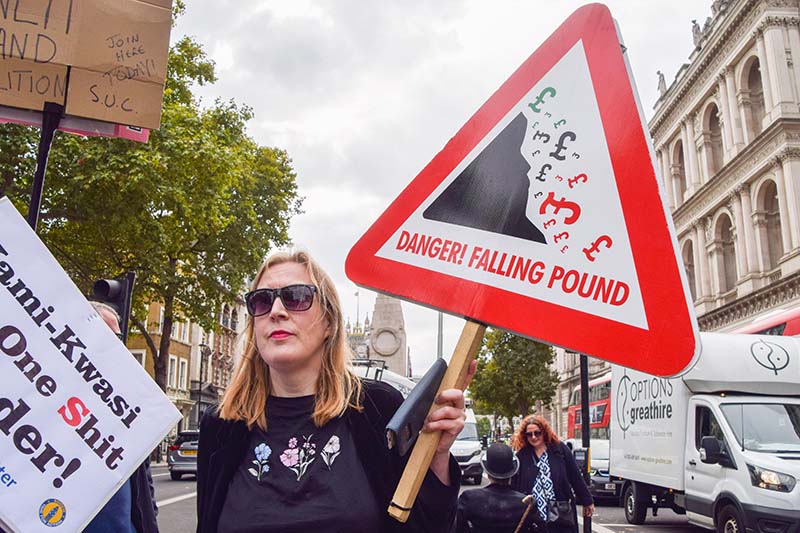Watching the baffled, wooden, awkward, hesitant, ill-at-ease and weirdly brief performance of the prime minister Liz Truss at her Friday press conference, I asked myself that if the most free-market Tory government since Margaret Thatcher had disastrously lost the confidence of the financial markets, would the country ever again vote for a party whose major claim to office is that it understands the market economy and how to handle it?
Could it ever put forward an “offer” to the country at election time which argued for tax cuts and deregulation as the free-market answer to the country's needs? Isn't that formula now permanently discredited? If I were a free marketeer I would be seriously worried that she has trashed the brand once and for all.
Let us count the ways, with apologies to Elizabeth Barrett Browning. Eight of them. First, her government had proposed huge tax cuts which were to be financed by borrowing. That borrowing would be delivered, if at all, by lenders who offer loans subject to interest rates. It is competitive, so lenders compete against each other for better returns. Sentiment in that or any other market place requires trust that the borrowers know what they are doing. A government which proposes tax cuts paid for by borrowing, universally regarded as unorthodox to say the least, will not have that confidence. So interest rates rise, to reflect the greater risk.
Secondly, the government failed not only to anticipate this dire result, but failed to see the effect it would have on other forms of borrowing such as mortgages used to raise capital to buy houses. So mortgage holders can expect a steep rise in their interest charges, reducing household incomes by hundreds of pounds a month.
Thirdly, the government proposed to pay off its extra borrowing – used to finance tax cuts – by triggering economic growth, and taxing that. It predicted growth of 2.5 per cent, but no independent analyst saw that as inevitable. It might well be zero, they thought, or even negative.
The fourth mistake therefore was not to have the government's arithmetic independently verified, which would have been the job of the Office for Budget Responsibility. It wasn't asked. So the whole edifice of economic policy was founded upon unverified, and in the view of many experts highly unlikely, expectations.
The fifth mistake was to assume that higher growth, if it occurred despite all the reasons given above, would inevitably “trickle down”, as the saying goes, to benefit ordinary people. This may be a belief, but it is far from a fact. Where it has been tried it hasn't worked. It stems from a reworked version of Adam Smith's famous theory that if everybody pursued their own interests, the result, as if by the working of “an invisible hand”, would be a general benefit to everyone. So “greed is good”, as it were. But note that in Smith's dictum – “By pursuing his own interest, he frequently promotes that of the society more effectually than when he really intends to promote it” – the tentative word “frequently” appears, not “inevitably” or “always”. So even Smith wasn’t sure.
Sixthly, she neglected to explain the connection between growth in the country as a whole, year-on-year increases to GDP, and individual personal wellbeing. Growth is an abstract understood by economists, but means little to the man or woman in the street. Their perception is that most of the rewards of increasing national prosperity find their way to those already at the top of the tree. Directors’ and senior managers’ remunerations have gone through the roof, while real average wages have stood still or even declined.
Seventhly, she embarked upon a tax and spend policy, fiscal policy, that was likely to increase inflation, while at the same time the Bank of England was raising interest rates, monetary policy, with the opposite intention. As the IMF politely pointed out, the two directions were incompatible. A train crash was inevitable.
Finally, economic policy – especially economic policy which is touted as a radical break with “stale economic orthodoxy” – has to be promoted in a way that builds trust rather than disregarding it. Being radical isn't enough. One must also be rational, reasonable and careful, and give an unmistakable impression that one knows what one is doing. The most common perception of Liz Truss as prime minister, even among her own MPs, is that she is lightweight and out of her depth. She lacks self-awareness. She is baffled by what has happened to her economic policy, and not even sure whom to blame. So short-sighted, indeed, that she cannot read the writing on the wall. It reads, as in the Book of Daniel: “You have been weighed on the scales and found wanting.”



 Loading ...
Loading ...
What do you think?
You can post as a subscriber user ...
User comments (0)